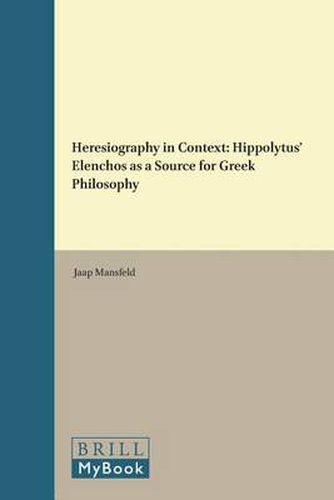Readings Newsletter
Become a Readings Member to make your shopping experience even easier.
Sign in or sign up for free!
You’re not far away from qualifying for FREE standard shipping within Australia
You’ve qualified for FREE standard shipping within Australia
The cart is loading…






The study of the Elenchos (c 225 CE) involves the whole range of ancient interpretative traditions concerned with Greek philosophy, from Aristotle to the late Neoplatonists. This study places Hippolytus’ reports about the Greek philosophers in the context of these traditions, examining both the Hippolytus’ achievements and the traditions he depends on. For him the Pythagoreanizing current in Pre-Neoplatonism is of major importance. Accordingly, he constructs a succession ( diadoche ) starting with Pythagoras and including Empedocles, Heraclitus, Plato, Aristotle and the Stoics, and argues that the diadoche of the Gnostic heresiarchs is parasitical on its Pythagorean predecessor. This assessment of the sources used is based on an analysis of Hippolytus’ method of presentation, which is a blend of cento and exegesis geared to his anti-Gnostic purpose.
$9.00 standard shipping within Australia
FREE standard shipping within Australia for orders over $100.00
Express & International shipping calculated at checkout
The study of the Elenchos (c 225 CE) involves the whole range of ancient interpretative traditions concerned with Greek philosophy, from Aristotle to the late Neoplatonists. This study places Hippolytus’ reports about the Greek philosophers in the context of these traditions, examining both the Hippolytus’ achievements and the traditions he depends on. For him the Pythagoreanizing current in Pre-Neoplatonism is of major importance. Accordingly, he constructs a succession ( diadoche ) starting with Pythagoras and including Empedocles, Heraclitus, Plato, Aristotle and the Stoics, and argues that the diadoche of the Gnostic heresiarchs is parasitical on its Pythagorean predecessor. This assessment of the sources used is based on an analysis of Hippolytus’ method of presentation, which is a blend of cento and exegesis geared to his anti-Gnostic purpose.